Master & Dynamic MW50 wireless headphones [Review]
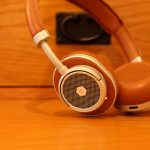
Headphone manufacturers must make deliberate audio signature decisions when crafting cans. Some shops, like GradoLabs, adopt a house sound. Relative newcomer Master & Dynamic's design ethic seeks to equally please eyes and ears. As such, its flagship wired headphones (MH40) and wireless (MW60) share similar industrial design. Aluminum, lambskin, leather, and stainless steel combine in rugged style that evokes aviators of a bygone era. The newer MW50 Bluetooth headphones strongly resemble the other two, but they're tuned for younger listeners on the move.
M&D's earlier cans are over-ear—meaning they cover the lobes, while the MW50 rest on them. The headphones are smaller and lighter than either the MH40 or MW60, but with most of the overall benefits of the latter, including excellent wireless reception. On-ear headphones can be uncomfortable to wear and leak in too much ambient noise. The MW50 push past both typical limitations, which, honestly, surprises me. I personally don’t find the design to be as attractive as the over-the-ear cans. It’s about the ear cups, which function matters more, however. The lambskin-covered ear pads are immensely comfortable, and the MW50 arguably are better all-around-wear than their siblings. I would take them outdoors on a walk, for example.
The problem with iPhone
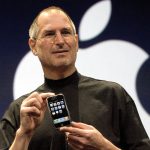
Today we arrive at the first of two 10-year anniversaries regarding iPhone: Steve Jobs unveiling the handset six months before its release -- unusual for Apple's then-CEO to pre-announce something, but necessary, with the federal regulatory rigmarole that cellular devices go through. Jobs and his management team brought the smartphone to market at great risk: Established and entrenched manufacturers, mainly Nokia, had huge distribution channels and massive amounts of research and development invested in their cellulars. iPhone debuted in one market (United States) and on a single carrier (AT&T, which concurrently rebranded). By most measures of business strategies: Insanity. But risk was a defining characteristic of Jobs' leadership style running the company.
You will read many "state of iPhone" analyses and commentaries this week spotlighting slowing sales, as buying growth plateaus in major markets (China, Europe, and the United States) and observing that Android continues to gobble global market share. The problem with iPhone is something else, and it's a metaphor for what's desperately wrong at Apple as 2017 starts: Loss of innovative mindshare; obsession with an outdated design motif; unwillingness to take meaningful risks. The company's fortunes rose with iPhone, and they will fall with it.
Tidal Masters go their own way

During Consumer Electronics Show 2017 yesterday, in licensing partnership with MQA, music streamer Tidal announced the new audio-fidelity tier "Masters", which is available for free to existing HiFi subscribers. Early album selection is extremely limited as is access option: macOS or Windows application. Both will expand in time.
But wow! I tested skeptically, wiring up my studio cans—Audio-Technica ATH-R70x—to 15.4-inch MacBook Pro with Touch Bar to hear the difference. Hehe, if any. I deliberately started with Fleetwood Mac's "Go Your Own Way" from album "Rumors", which released 40 years ago on February 4th. Tidal claims that Masters recordings deliver "an audio experience exactly as the artist intended". The band spent nearly a year painstakingly recording and engineering the disc, making any, or all, the songs great test cases.
My favorite tech items of 2016 [Joe]
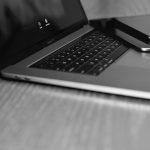
The year 2016 is when the United States sold its soul to Donald Trump and I signed over mine to Apple. How's that for introduction to the five favs series, joining colleagues Alan Buckingham, Brian Fagioli, and Wayne Williams? Yup. I'm an Apple whore as 2017 opens onto its second day. The fruit-logo company won back my business as I gave up the Google lifestyle. Three main reasons: 1) I believed CEO Tim Cook's privacy promises, all while my concerns about Big G information collection increased. 2) I found the visual acuity of Apple fonts and user interfaces to be far superior to Google's, which helped compensate for diminishing reading vision (later recovered through eye surgery). 3) Google's platforms proved inadequate for easily recording, producing, and publishing the Frak That! podcast (a fun side project).
My contribution to the series is a bit disingenuous, though. I wouldn't call these "My favorite tech items of 2016". They are what I bought, or was released, last year that I use most often, regardless of their benefits and flaws. Each will get belated review sometime during the next few months. Consider this story each's preview. Okay, let's get to them.
Adieu, Yahoo

Yahoo, one of the earliest and brightest dot-coms, is a Hellhole at the close of 2016. It stinks of decay and neglect. The 1 billion active user accounts ravaged by hackers is a metaphor for the trendy neighborhood turned into gang-ridden slum. Verizon was, or maybe still is, buying Yahoo. Walk away, I say, unless Yahoo is willing to pay for the privilege of becoming part of the expanding VZN communications and media empire.
I typically make many changes at the start of the new year, and as 2017 begins, I take my advice offered to Verizon: Abandon Yahoo. First to go is its photo-sharing site, for many of the reasons stated seven months ago. My Flickr Pro account expires in September, and I will cancel a few weeks earlier to prevent auto-renewal. In the meantime, I consider my Flickr officially closed, and I will no longer use it. All photos will remain until the service makes them unavailable—and pursuant to the terms,
Got MacBook Pro with Touch Bar? How's your battery life?

Consumer Reports played nasty, little Santa's helper by plopping a piece of chunky coal into Apple's Christmas stocking, when denying the coveted—and expected—recommendation. Holy Moly. Over the holiday, the InterWebs exploded with stories during an otherwise, slow tech news cycle. CR found widely, or perhaps wildly, inconsistent charge-to-depletion times for MacBook Pro with Touch Bar. Uh-oh. At least the lap-hugger isn't explodin', like the Samsung Galaxy Note 7. B-b-b-boom!
Perhaps, like me, you bought or received as present, one of these newfangled Macs. I have some questions about your experience starting with: How's your battery life? Do you get enough from the laptop to justify the price increase over last year's model? If you bought, or received, something else, did news about battery life affect the decision? Since we're all sharing our deepest, innermost MacBook Pro secrets, from here I will reveal my own. I bought not one, but two. Problems with the first, but not the second, and possible remedy will be familiar to long-time Windows users.
Apple's 'lump of coal in your stocking' Christmas

Apple sure knows how to keep its store stocked for the holidays. Ho, ho, ho, bah humbug. The shelves are bare, and you can get your must-have pretty thing some time next year. If you're lucky. Let's start with the delayed AirPods, which went on sale online last week. They arrived in stores on Monday, and whoosh were gone before the waiting line ended. My local shop had about 30 pairs. If you want them, first available retail pickup date is—cough, cough—February 8th. That is 2017. I had to confirm not 2018, because you never know with these dumbfounding delays. Straight-to-ship orders move your way in six weeks. Donald Trump will be president sooner!
Perhaps you're pining for one of those pricey MacBook Pros—you know, the ones with Touch Bar that no sane person knows what to do with. Apple will miss Christmas, but you can still beat Martin Luther King's birthday, with orders made today delivering sometime between January 4-10 or available for in-store pickup on the tenth. God Bless America and Made in China!
DirecTV Now is a bargain -- for NOW

From the day I received the Oct. 14, 2016 letter about billing changes, AT&T U-verse and Internet cancellation was inevitable. I had auto-pay set up to a credit card, but the service provider wanted access to my bank account, which I didn't want to give. "Beginning in December, your credit card will be charged eight days after your Bill Cycle date", the correspondence reads. The change meant AT&T would take payment on the 8th of the month rather than the 21st. Since the company bills a month in advance, the new date would work out to about six-weeks in fees paid ahead for future service. On principle, being an independent-minded "don't tell me what to do" Mainer, I considered other options.
Ironically, the launch of another AT&T service, DirecTV Now, on October 30th, made the decision to cancel super easy. After several starts and stops, the Wilcox household has finally cut the cord for good. DirecTV Now is the nudge, but other streaming services make a big difference, too. Much has changed since the last cord-cutting effort, in November 2015, which we abandoned after about 7 weeks. The quality and quantity of original programming from Amazon, Hulu, and Netflix is greater and hugely enticing 12 months later.
iPhone should replace Chromebook in the classroom
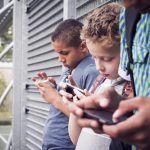
Many educators won't agree, but perhaps students will: The PC, whether desktop or notebook, is obsolete in the classroom. This reality, if accepted for what it is, presents Apple opportunity to retake the K-12 market from Alphabet-subsidiary Google's incursion and sudden success with Chromebook among U.S. schools. If the fruit-logo company doesn't seize the moment, a competitor will—and almost certainly selling devices running Android.
Chromebook's educational appeal is three-fold: low cost, manageability, and easy access to Google informational services. For buy-in price, and TCO, no Apple laptop or tablet running macOS or iOS, respectively, can compete. Think differently! Providing students any kind of computer is shortsighted, by narrowly presuming that schools, or their parents, must buy something. I suggest, in this time of budgetary constraints, that educators instead use what the kids already possess (or want to) and what they use easily and quickly: The smartphone.
Chromebook's future is bleak
A few days ago, one of my Google+ followers, Steve Kluver, commented on an August 2014 share: "I am shopping for some more Chromebooks this Holiday Season, and found this post via G+ hashtag #chromebook search. How current is your ebook now?" He refers to Chromebook Reviews, which is available from Amazon for sale or for free reading with Kindle Unlimited. I apologized that the tome, published more than two years ago, is "way out of date". If I'm not going to revise, I really should remove the title.
I offered to give him buying advice, which got me to thinking about Chromebook as a concept and computing edifice. While a big fan, and owner of both generations of Google-made Chromebook Pixel, my primary laptop was a MacBook Pro for most of 2016. Measure of commitment: I bought the new 15.4-inch Touch Bar model just a few weeks ago. I've moved on, and got to thinking about why in crafting my response.
I chose MacBook Pro with Touch Bar over Surface Book
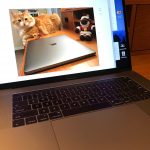
Water smacked the windshield -- a torrent of heavy droplets -- as my wife struggled to feed money into the tollbooth machine. Pelting rain is uncommon during November in San Diego, but we had purpose for driving 36 km through the downpour to Chula Vista and the Otay Ranch Apple Store, where I had never been before. The shop was the only one around that had the 15.4-inch MacBook Pro with Touch Bar in stock.
Eleven days earlier, Nov. 15, 2016, I received the 13.3-inch model that was ordered on October 27th. While first impressions were wow, the laptop felt slow compared to my previous MBP, and the battery drained in about half the time as specs stated. I worried that Apple produced a defective unit. No store in the area had the smaller laptop in stock, should I want to take advantage of the 14-day return policy. Deadline approached, so I considered as alternative my first 15-incher in more than a decade, tempted in part by quad-core processor and discreet graphics.
Would a Trump administration allow Google to sell Motorola to Lenovo?

I don't want to start an argument about politics. My sentiment this lovely day derives from what the incoming White House is, not what so many people here in California want it to be. I wonder: If Google bought Motorola during a Trump presidency, rather than Obama regime, would later sale to Lenovo be allowed or closing of the Texas phone-assembly factory about 18 months after opening?
The question arises from a pique of sadness as I look at the FedEx tracking information for two Motorola phones purchased directly from Lenovo. City of origin: Wuhan, China. My last Moto came from the Lone Star State, here in the USA. I pine for what might have been, remembering my excitement about Google's $12.5 billion Motorola Mobility acquisition, in August 2011. My opinion expressed then remains: "The acquisition is bold for its risks, which are no less great than the benefits". I was no fan of the later sale to Lenovo.
IDC was so wrong about Windows Phone

I laughed so hard and so often at IDC's smartphone forecast, my response took nine days to write -- okay, to even start it. The future isn't my chuckable -- that data looks reasonably believable enough -- but the past. Because 2016 was supposed to be the year that Microsoft's mobile OS rose from the ashes of Symbian to surpass iOS and to challenge Android.
In 2011, IDC forecast that Windows Phone global smartphone OS market share would top 20 percent in 2015. The analyst firm reiterated the platform's No. 2 status for 2016 in 2012 as well. Not that I ever believed the ridiculous forecasts, writing: "If Windows Phone is No. 2 by 2015, I'll kiss Steve Ballmer's feet" and "If Windows Phone is No. 2 by 2016, I'll clean Steve Ballmer's toilet". The CEO's later retirement let me lose from those obligations had I been wrong. I was confident in my analysis being truer.
Google OnHub Soars, Apple AirPort Crashes
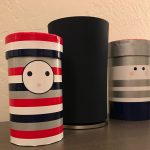
We all make mistakes. The challenge is recognizing and correcting them quickly enough. So comes admission: I bought Apple AirPort Time Capsule to replace Google OnHub—what a bad decision.
My tale starts with a chance sighting on Kinja Deals for the 2TB Apple WiFi router on sale at Amazon for $199; one-hundred bucks off. I ordered on Nov. 16, 2016, and the device arrived two days later. At the time, I had 45Mbps AT&T Internet (which has changed since). Placed in the same location where OnHub had been, about 3 meters away from my desk in the same room as the router, throughput consistently came in at 15Mbps, occasionally a little more, as measured by Fast.com or SpeedTest.Net. By contrast, Google's router wirelessly pumped 40Mbps or more. Ah, yeah.
For the audiophile: Grado Labs RS1e [Review]
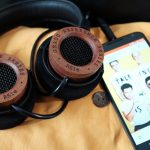
Late last month, I sold my beloved Grado RS1e headphones, which get my highest recommendation. Parting ways, time is long overdue for a review, even if post-mortem. I let go the cans mainly because my lifestyle changed. Being tethered by wires is too confining; I listen to music more on the move now. As such, fine-fidelity Bluetooth cans—Master & Dynamic MW60—give great sound with more flexibility and mobility.
I purchased the RS1e direct from manufacturer Grado Labs in late July 2014, soon after release. Grado is a family-owned/run Brooklyn, New York-based business that opened in 1953 offering turntable cartridges. In 1990, the company started selling headphones, which are hand-crafted and tested for the distinctive, sound signature that defines them. Founder Joseph Grado passed away in February 2015 at age 90.
Joe's Bio
Joe Wilcox is BetaNews executive editor. His motto: Change the rules. Joe is a former CNET News staff writer, JupiterResearch senior analyst, and Ziff Davis Enterprise Microsoft Watch editor.
Ethics Statement© 1998-2025 BetaNews, Inc. All Rights Reserved. About Us - Privacy Policy - Cookie Policy - Sitemap.
